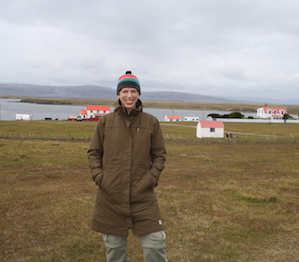News
» Go to news main"Being in the place": Kate Sherren visits the Falkland Islands
 Dr. Kate Sherren adventured into rugged terrain, penguin colonies and sheep farms on a delegation to the Falkland Islands in January. The assistant professor with the School for Resource and Environmental Studies was one of 12 Pan-American scholars invited to participate in the first Falkland Islands Science Symposium.
Dr. Kate Sherren adventured into rugged terrain, penguin colonies and sheep farms on a delegation to the Falkland Islands in January. The assistant professor with the School for Resource and Environmental Studies was one of 12 Pan-American scholars invited to participate in the first Falkland Islands Science Symposium.
The government of the Falklands, located off the southern tip of South America, collaborated with the South Atlantic Environmental Research Institute to host the symposium, which brought together scientists from Canada, the United States, Chile, Brazil, Mexico and Colombia. The symposium’s goal was to introduce the Falklands and South Atlantic region as a venue for research, and to establish ties between Falklands researchers and their neighbours in the region. Given the distance from the UK and the relative isolation of this territory, the British and Falklands governments see research as a valuable means to regional communication. “It was partly about science as diplomacy,” explains Dr. Sherren. Lindsay Chura, Senior Policy Advisor in Science and Innovation at the British Embassy in Washington and the delegation leader, describes the Falkland Islands as “a largely un-researched, pristine environment for scientific exploration.”
Dr. Sherren explains that oil and gas exploration in the Falklands was the initial trigger for her participation. Late last year a small group of industry, government and academic personnel from the UK and Falklands visited Atlantic Canada and pinpointed SRES as an information resource. After hearing about Dr. Sherren’s work examining links between humans and the natural world, they invited her to join the delegation. One of only two Canadians at the symposium, Dr. Sherren was also the only social scientist—all other participants were hard scientists working in fields like botany and marine biology. “It was the Falklanders who wanted me to come,” she observes. “Because this is where they live. They worry about social change.”
With interests in cartography and in the connection between landscapes and people, Dr. Sherren was thrilled to be part of the delegation. “I have a thing about islands,” she says, noting that in a cartographic sense, they are appealingly discrete and self-contained. Off the map, the residents of the Falklands have responded to this isolated aspect of the Islands for generations. “The Falklands has an authentic commitment to sustainability,” explains Dr. Sherren. “They have to.” She describes the Falklands as a “microcosm” of social and environmental systems. “It’s kind of like a sustainability lab,” she says. “It’s a country of several thousand with the need to develop and carry out legislation and policy in very close proximity to all of its citizens and industry.”
The Symposium benefitted from Dr. Sherren’s expertise, said Dr. Chura: “She brought unique perspective to this delegation by providing contextual dimension to the scientific opportunities in the Falklands and the role the wider community plays in defining these opportunities.” Dr. Sherren, in turn, came home with several new avenues for research in the South Atlantic, ranging from grazing practices to eco-tourism. “I will definitely be returning to the Falklands because of this trip,” she says. “Any work that I do has to begin with being in the place.” As Dr. Sherren remarks, the novel interactions of people, industry and nature, plus the unique history of the Falklands, make it a perfect place for her to work.
Recent News
- Professor M. Ali Ülkü receives 2024 Archibald Award
- Project to address harmful language relating to Indigenous peoples receives prestigious Mellon Award
- Four decades of friendly hellos
- Students speak with passion about recipients of Teaching Excellence Award
- Brothers, and Dal alums, adapt and learn to achieve career success
- Najah Attig and Oumar Sy win prestigious Graham and Dodd Scroll Award
- Curiosity in human behaviour leads Huiyan Liu (MSc’23 ) to a PhD
- In Memoriam – Dr. James R. Barker
